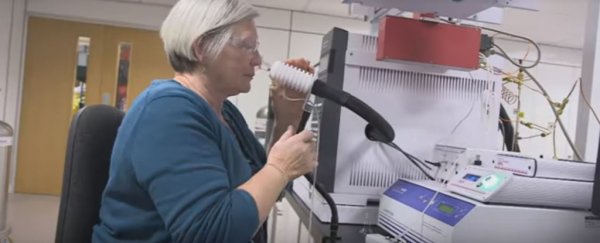At the moment, there's no definitive diagnostic test for Parkinson's. Soon, that might change thanks to a woman called Joy Milne – she can sniff out the brain disease on someone before the symptoms appear.
It sounds too bizarre to be true, but Joy noticed the "musky" smell on her husband 10 years before he was diagnosed with Parkinson's by doctors. When she went to a meeting with other people with the condition, she realised the smell and the disease were linked.
Since then, scientists have been working with Joy to try and identify what exactly she was smelling. It seems to be linked to sebum - the oily secretion that helps keep our skin and hair naturally moisturised, and which can be produced more in people with Parkinson's.
While it was already known that Parkinson's leads to increased sebum production, the researchers wanted to know exactly which biomarkers were giving off the scent Joy was picking up, so they used mass spectrometry chemical analysis to extract individual compounds.
"We designed some experiments to mimic what Joy does, to use a mass spectrometer to do what Joy can do when she smells these things on people with Parkinson's," one of the team, Perdita Barran from the University of Manchester in the UK, told the BBC.
Swabs were taken from 64 volunteers, some with Parkinson's and some without, to present to "super smeller" Joy Milne for analysis. The people with the disease were found to have more hippuric acid, eicosane, octadecanal, and other biomarkers in their sebum.
The presence of these molecular compounds is linked to the shifting levels of neurotransmitters in people with Parkinson's – those chemical messengers that help neurons connect and control our thoughts and movement.
"This could have a huge impact not only for earlier and conclusive diagnosis but also help patients monitor the effect of therapy," says Barran.
While 64 people is a relatively small sample, and it's not yet clear how early a sebum scent could detect Parkinson's, there's a lot of potential here – if a swab test can be developed, it would be easy to take and relatively simple to analyse.
And while there's no cure yet for Parkinson's, the earlier we catch it the better – we might well discover how to prevent Parkinson's before we work out how to cure it when it gets to its latter stages.
Most of us don't notice any change in smell with people who have Parkinson's – scientists think that a specially acute sense of smell, like the one Joy has, is needed to pick up on the different odour.
In fact, Joy claims she can smell the scents of other diseases like Alzheimer's and cancer too – so she's not done yet in helping the progress of science. Next she's going to work with the same team on a diagnostic test for potentially spotting tuberculosis.
More than 10 million people worldwide are living with Parkinson's, a number which is expected to climb steeply in future as the population ages. Thanks to Joy and the work of the researchers behind this new study, we might be able to do something about that.
"What we might hope is if we can diagnose people earlier, before the motor symptoms come in, that there will be treatments that can prevent the disease spreading," Barran told the BBC. "So that's really the ultimate ambition."
The research has been published in ACS Central Science.
